Get engrossed in the twists and turns of Abraham's lineage, where ancient tales shape today's faiths and nations.
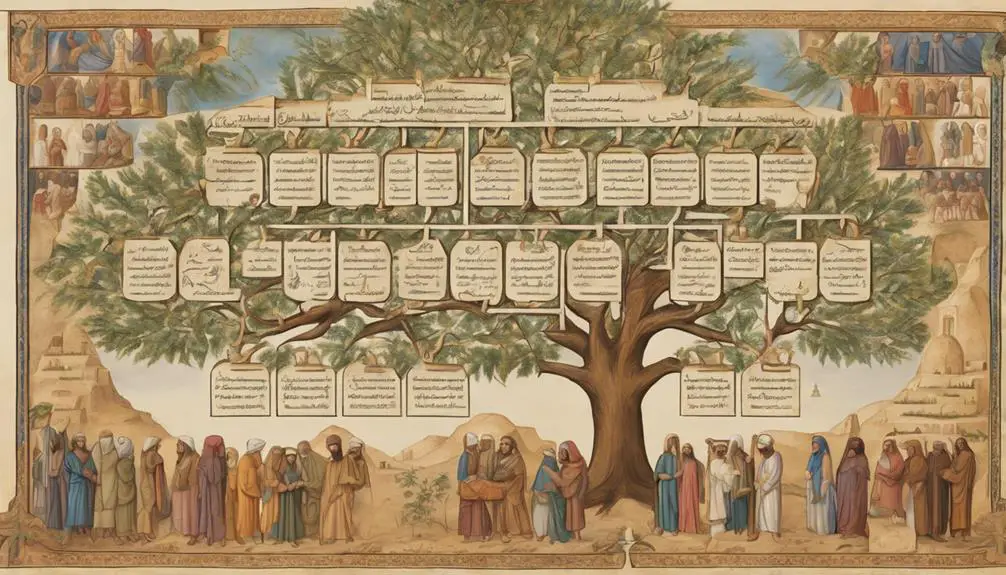
Abraham's Lineage in the Bible
In the grand soap opera that is biblical genealogy, Abraham's lineage takes the spotlight, boasting more drama than your average prime-time show. You've got promises made by God himself, a son born against all odds, and sibling rivalry that could rival any modern drama.
But it's not just about who begot whom; this lineage is the foundation of entire nations and religions. As you explore further, you'll uncover how these ancient narratives still shape our world today, leaving you to ponder the profound impacts of these stories on contemporary faith and culture.
Key Takeaways
- Abraham's covenant with God establishes a lineage foundational to Abrahamic faiths, highlighting a unique, faith-based relationship with the divine.
- Isaac, as the promised son, embodies the fulfillment of God's promises, emphasizing the importance of faith and obedience in divine narratives.
- Jacob and Esau's stories illustrate the complexities of divine promises and familial relationships, impacting the legacy and direction of Abraham's descendants.
- The Twelve Tribes of Israel and Ishmael's lineage reflect the broad and diverse impact of Abraham's covenant, shaping historical, cultural, and religious contexts.
The Covenant With Abraham

In establishing the foundation of Abraham's extensive lineage, it's crucial to examine the covenant God made with him, a pivotal moment that not only shaped his descendants' destiny but also underscored a profound theological shift in biblical narratives. This covenant, a solemn agreement between the divine and Abraham, marks a cornerstone in the history of Abrahamic faiths. It's not merely a promise of numerous offspring; it signifies the inception of a unique relationship between God and humanity, predicated on faith and obedience.
The sacrificial test, where Abraham is commanded to sacrifice his son, further cements this covenant. This episode, fraught with emotional and theological complexity, serves as a testament to Abraham's unwavering faith. It's a narrative that has been dissected and pondered over centuries, offering deep insights into the nature of faith, obedience, and divine testing.
This covenantal relationship establishes a framework within which the Abrahamic faiths understand their bond with the divine. It lays the groundwork for the development of a communal identity, deeply rooted in the notion of a chosen people, bound by a divine promise. This foundational event not only shapes the contours of Abraham's lineage but also instills a collective memory that influences theological thought and community identity across generations.
Isaac: The Promised Son
Building upon the foundational covenant between God and Abraham, Isaac emerges as the promised son, symbolizing the fulfillment of divine assurances and setting a precedent for faith and obedience in the unfolding narrative of Abraham's lineage. His birth, foretold by God, marks a pivotal moment where the seemingly impossible becomes reality, highlighting the power of faith in the divine promise. Isaac's life is characterized by trials that test his faith and obedience, notably in the event of the Akedah, where Abraham's willingness to sacrifice Isaac epitomizes sacrificial faith. This moment, fraught with existential dread, ultimately reinforces the covenantal relationship between God and Abraham's descendants, with Isaac standing as a central figure in this divine narrative.
Isaac's story also delves into the complexities of family dynamics, showcasing maternal favoritism towards Jacob, his younger son. This favoritism, which echoes through the generations, plays a significant role in shaping the future of Abraham's lineage. It not only influences the interpersonal relationships within the family but also sets the stage for the unfolding of God's plan for His chosen people. Through Isaac, themes of faith, obedience, and the impact of familial relationships are intricately woven into the fabric of Abraham's lineage, offering profound insights into the human-divine relationship.
Jacob and Esau's Legacy
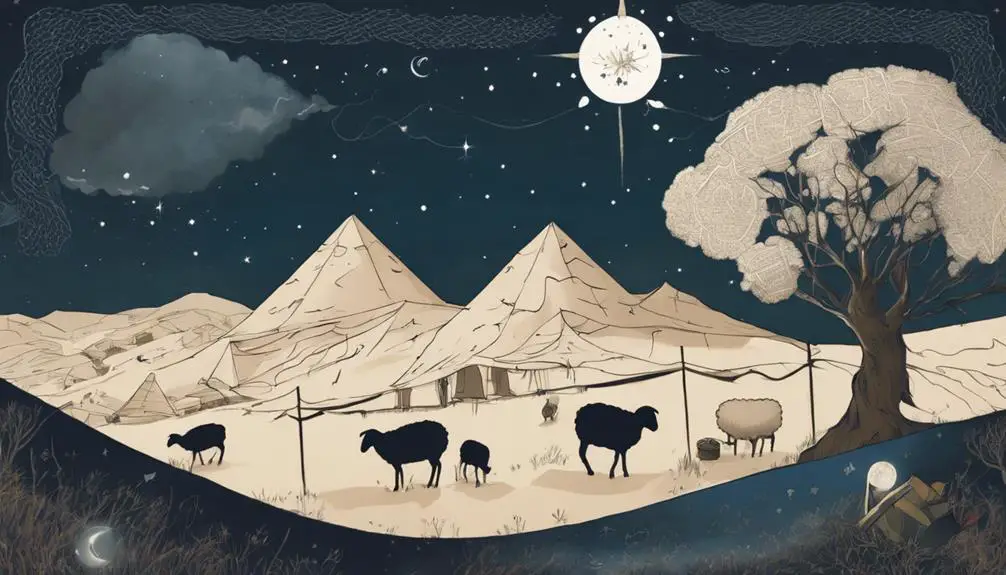
Jacob and Esau's legacy profoundly shapes the trajectory of Abraham's lineage, reflecting a complex interplay of familial blessings, rivalry, and the unfolding of divine promises. Their story isn't just about sibling conflict; it's a narrative filled with deep theological and historical implications. You'll see how their destinies diverge and set the stage for the future of their descendants.
- Jacob's wrestling: This pivotal event symbolizes his struggles and the transformative moments in his life, leading to a new identity and blessings that impact generations.
- Esau's descendants: Often overlooked, Esau's lineage plays a crucial role in the biblical narrative, showcasing the broader scope of Abraham's influence beyond the chosen lineage.
- Divine intervention: The story is rife with moments where divine promises and interventions direct the paths of Jacob and Esau, highlighting the complexity of their roles within Abraham's lineage.
- Familial blessings and rivalry: Their interactions underscore the potent mix of familial love, jealousy, and the pursuit of blessings, which reverberate through their descendants.
Understanding Jacob and Esau's legacy offers invaluable insights into the intricate dynamics of familial relationships and divine promises within Abraham's lineage, echoing themes of struggle, transformation, and redemption that resonate through biblical history.
The Twelve Tribes of Israel
Exploring the Twelve Tribes of Israel reveals how Jacob's transformation and the resolution of his rivalry with Esau underpin the establishment and destiny of these foundational groups within the biblical narrative. These tribes, originating from Jacob's twelve sons, symbolize the nascent nation of Israel, each with unique tribal symbols representing their identity and role. The allocation of land to each tribe, as detailed in biblical texts, not only signifies their physical inheritance but also marks the divine promise of nationhood and prosperity.
The tribal symbols, ranging from Judah's lion to Benjamin's wolf, convey deeper meanings about the character and destiny of the tribes. These symbols are integral to understanding the tribes' roles in Israel's history and their spiritual significance. The land allocation, meticulously described, served as a tangible manifestation of the covenant between God and Abraham's descendants. It established a geographical and spiritual framework for the nation's development.
Analyzing the Twelve Tribes of Israel, you uncover layers of meaning in their symbols and the strategic distribution of land. This not only shaped their societal structure but also underscored their collective identity as God's chosen people, fulfilling Abraham's legacy.
Ishmael and the Ishmaelites
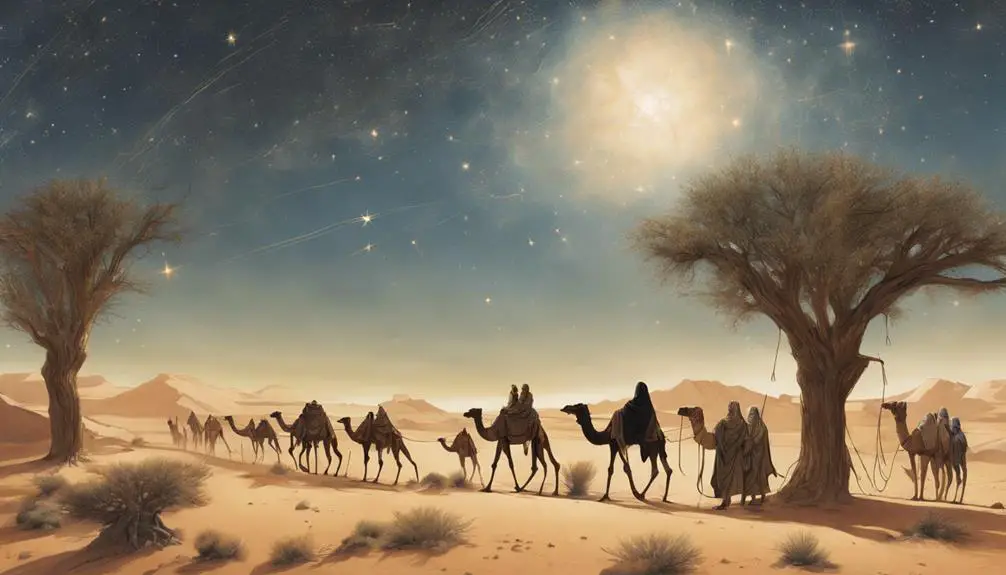
Delving into the story of Ishmael, you'll find that his lineage, the Ishmaelites, plays a pivotal role in the broader biblical narrative, intertwining with Abraham's legacy through complex familial and cultural developments. Ishmael, Abraham's first son through Hagar, is often considered the progenitor of the Arab nations, marking a significant branch of Abraham's descendants with unique cultural and historical implications.
- Ishmael's descendants: Traditionally viewed as the ancestors of many Arab peoples, Ishmael's lineage is significant for its contribution to the ethnic and cultural diversity in the biblical world.
- Arab connections: The association between Ishmaelites and Arab tribes underscores ancient Near Eastern genealogical traditions, highlighting intricate relationships between different groups.
- Biblical references: Ishmael and his descendants are mentioned throughout the Bible, illustrating their ongoing interaction with other descendants of Abraham, especially in narratives involving trade and conflict.
- Cultural legacy: The Ishmaelites' contribution to the region's history and culture, particularly in terms of trade routes and linguistic exchange, is a testament to their enduring influence.
Analyzing Ishmael's story and the trajectory of his descendants sheds light on the complex tapestry of relationships and identities that emerged from Abraham's lineage, offering insights into the historical and cultural dynamics of the ancient Near East.
Frequently Asked Questions
How Does Abraham's Lineage Influence Modern Religious Practices Across Different Faiths?
You'll find Abraham's lineage shapes modern religious practices significantly, fostering interfaith dialogues and cultural impacts across various faiths. This common ancestry encourages understanding and cooperation among Judaism, Christianity, and Islam, enriching their traditions.
It's not just about shared stories; it's how these narratives influence present-day beliefs, rituals, and the way communities interact. Delving into this lineage, you uncover a deep-rooted influence that transcends mere historical connection, shaping contemporary spiritual landscapes.
Are There Significant Archaeological Findings That Corroborate the Existence and Lineage of Abraham Outside of Biblical Texts?
When you're digging for truth, it's essential to sift through evidence beyond stories passed down through generations. Unfortunately, no concrete archaeological findings directly corroborate Abraham's existence and lineage outside biblical texts.
However, ancient texts comparison and cultural influence analysis shed light on the impact of his supposed legacy across civilizations. These scholarly approaches help bridge gaps, providing insight into how Abraham's narrative may have woven into the fabric of ancient societies, albeit indirectly.
How Have Interpretations of Abraham's Lineage Evolved in Contemporary Theological Studies?
In contemporary theological studies, interpretations of Abraham's lineage have evolved significantly.
You'll find scholars using genealogical metaphors and theological symbolism to delve deeper into its meanings.
They're not just tracing a bloodline; they're exploring how this lineage symbolizes faith, covenant, and identity across different cultures and religions.
This analytical approach has enriched our understanding, showing how Abraham's descendants represent more than historical figures—they embody a rich tapestry of spiritual heritage.
Can Genetic or DNA Studies Provide Insights Into the Historical Accuracy of Abraham's Lineage as Described in the Bible?
You might wonder if genetic methodologies can shed light on historical narratives. In the case of ancient lineages, DNA studies offer potential insights but also spark controversies. These approaches require careful analysis, as genetic evidence can sometimes challenge traditional accounts.
What Are the Ethical and Moral Lessons Derived From Abraham's Lineage That Are Relevant to Today's Societal Challenges?
You'll find that exploring family dynamics and societal leadership can offer timeless lessons, much like those gleaned from historical narratives. Analyzing such stories shows how resilience, faith, and leadership within a family can shape societal norms and challenges.
These tales underscore the importance of ethical decision-making and moral courage in facing today's societal issues, offering a blueprint for navigating complex relationships and leading with integrity in our communities.
Conclusion
In sum, Abraham's lineage, as depicted in the Bible, remains a cornerstone of Judeo-Christian heritage, embodying a narrative of faith, promise, and complex familial legacies.
From Isaac's miraculous birth to Jacob's transformation into Israel, and the diverging paths of Esau and the Twelve Tribes, to Ishmael's significant role in Islamic tradition, this lineage echoes the labyrinthine journey of humanity itself.
Much like Virgil's Aeneas, Abraham's descendants traverse a path that's both divinely ordained and fraught with human frailty, weaving a rich tapestry of theological and cultural significance.

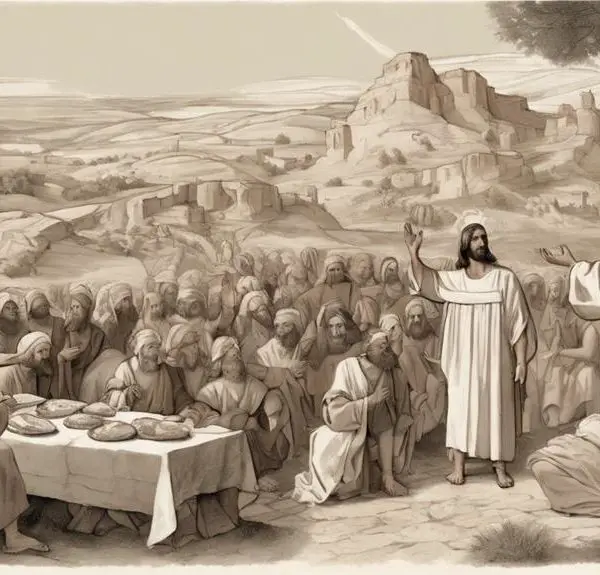
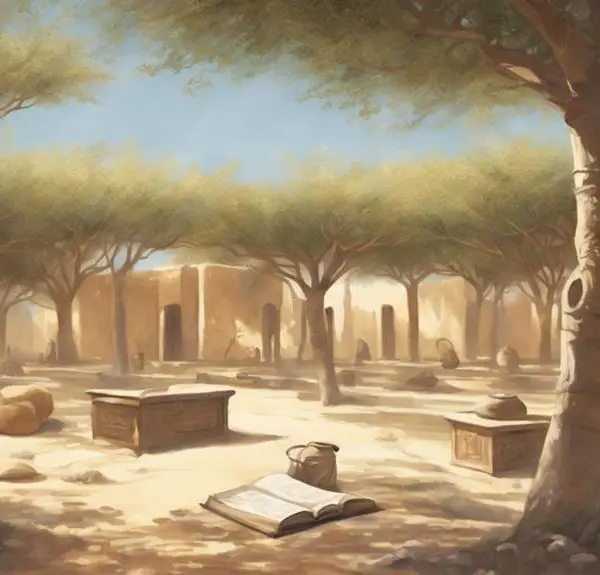
Sign up